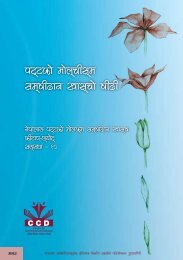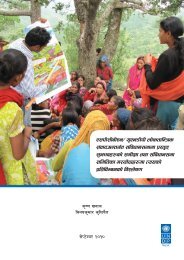English - Support to Participatory Constitution Building in Nepal ...
English - Support to Participatory Constitution Building in Nepal ...
English - Support to Participatory Constitution Building in Nepal ...
Create successful ePaper yourself
Turn your PDF publications into a flip-book with our unique Google optimized e-Paper software.
Post-conflict state build<strong>in</strong>gboundaries of highly demarcated spaces. Thus, it <strong>in</strong>vokes 'articulations ofseparateness, of limitations <strong>to</strong> access, and of strict boundedness' (Jabri1996, pp 130-131).Post-conflict space is given its special character partially by the<strong>in</strong>tervention of <strong>in</strong>ternational and transnational ac<strong>to</strong>rs which might affectthe k<strong>in</strong>ds of dom<strong>in</strong>ation and resistance tak<strong>in</strong>g place. The extent <strong>to</strong> which<strong>in</strong>ternational ac<strong>to</strong>rs are able <strong>to</strong> alter local and national political relations isthe key question. Afghanistan could be taken as an example <strong>to</strong> show how<strong>in</strong>ternational <strong>in</strong>tervention which, at present, shows no sign of completion.Rather than build<strong>in</strong>g a sovereign state, it creates <strong>in</strong>ternational space forelite whose position rema<strong>in</strong>s weak across large parts of Afghan terri<strong>to</strong>ry.Similar examples could be cited from <strong>Nepal</strong> <strong>to</strong>o where, at different timeperiods, different <strong>in</strong>dividuals (political elites) have been supported by<strong>in</strong>ternational ac<strong>to</strong>rs (countries and/or multi-nationals) and <strong>in</strong>stituted <strong>in</strong>powerful positions.The legitimat<strong>in</strong>g of this idea of <strong>in</strong>ternational <strong>in</strong>terventions for peaceand democracy opens up new terri<strong>to</strong>ries for <strong>in</strong>ternational <strong>in</strong>terventionand the creation of au<strong>to</strong>nomous spaces of <strong>in</strong>ternational adm<strong>in</strong>istration.The governance dynamics of such entities can be driven primarily byglobal ac<strong>to</strong>rs <strong>in</strong> cases where local elites are excluded. Yet, this <strong>in</strong>evitablyprovokes a reaction. We must look at how the <strong>in</strong>creas<strong>in</strong>g <strong>in</strong>volvement of<strong>in</strong>ternational organisations and transnational companies <strong>in</strong> post-conflictspaces may help produce new forms of governance and resistance, bothlocally and globally. If the local, regional and global <strong>in</strong>teractions are notproperly unders<strong>to</strong>od and carefully handled, a return <strong>to</strong> a precarious ethnopoliticsmay be produced lead<strong>in</strong>g <strong>to</strong> further armed conflict <strong>in</strong> the future.Though gravely related with the issue of national <strong>in</strong>tegrity, it is <strong>in</strong>dicative<strong>to</strong> a complex task of state build<strong>in</strong>g <strong>in</strong> post-conflict <strong>Nepal</strong>.Tak<strong>in</strong>g <strong>in</strong><strong>to</strong> account the micro aspects <strong>in</strong> re-mak<strong>in</strong>g, state build<strong>in</strong>g is not asimple job that becomes complete overnight. Countries like Nigeria havenot yet become fully successful <strong>in</strong> realis<strong>in</strong>g the state build<strong>in</strong>g process.Even India and Ch<strong>in</strong>a, the emerg<strong>in</strong>g South Asian giants, are under criticismfor promot<strong>in</strong>g regional imbalance of development with<strong>in</strong> the country.It is observed that the four years s<strong>in</strong>ce the American-led <strong>in</strong>vasion ofAfghanistan, the US has learnt some pa<strong>in</strong>ful lessons about state build<strong>in</strong>g<strong>in</strong> both Afghanistan and Iraq (Fukuyama 2009). We have many lessons <strong>to</strong>learn from global experiences. But it is not that state build<strong>in</strong>g is a far-cryfor us. There are many spaces from where we can start out. This book,<strong>in</strong>deed, deals with those very issues.10




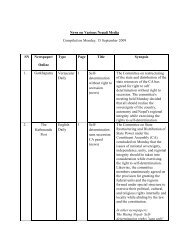
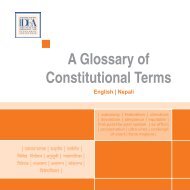
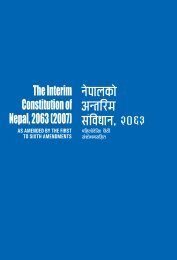
![g]k fnsf blntx? / gofF ;+l jwfg](https://img.yumpu.com/49483602/1/184x260/gk-fnsf-blntx-goff-l-jwfg.jpg?quality=85)
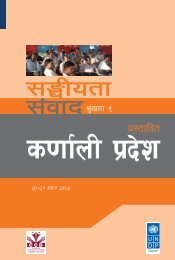
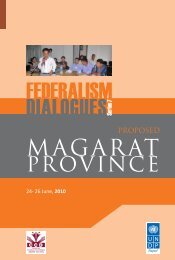
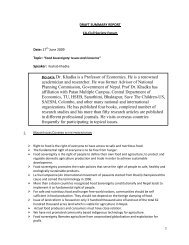
![+ljwfg;ef, /fHosf]k'g](https://img.yumpu.com/41604075/1/184x260/-ljwfgef-fhosfkg.jpg?quality=85)
